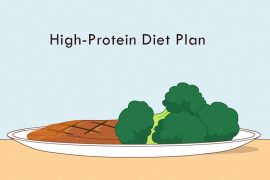A recent study highlights that many Indians consume inadequate amounts of essential nutrient, posing long-term risks to health. Despite the diversity of the Indian diet, which includes a wide range of foods, both fresh and processed, nutritional deficiencies remain common due to factors such as dietary habits, socioeconomic challenges, and regional differences. These deficiencies can compromise the body’s healthy functioning, leading to various health issues over time. The increasing consumption of packaged and processed foods further exacerbates the problem, making balanced nutrition a growing concern across the population.
The common Indian diet:
The common Indian diet, rich in grains, pulses, vegetables, and dairy, often falls short in providing adequate essential nutrients such as iron, calcium, and folate, with women being especially affected. Traditional diets, typically centered around staples like rice, wheat, and lentils, may lack diversity and essential vitamins, with vegetarianism further contributing to potential deficiencies in vitamin B12 and omega-3 fatty acids. The rising consumption of processed foods, limited sun exposure affecting vitamin D synthesis, and nutrient loss from traditional cooking methods, such as boiling or frying, exacerbate these issues. Additionally, the presence of phytates in whole grains and legumes can inhibit zinc absorption, while the under-consumption of green leafy vegetables impacts vitamin A and folate intake, leading to widespread nutritional deficiencies.
Nutritional deficiencies in India impact:
Nutritional deficiencies in India impact all age groups, but certain demographics are particularly vulnerable. Infants and children between 6 to 23 months and adolescents aged 12 to 15 are at higher risk of nutrient deficiencies, with issues like iron deficiency anemia, vitamin A deficiency, and protein-energy malnutrition being common. Older adults frequently experience deficiencies in vitamin D, calcium, and vitamin B12, as aging affects nutrient absorption and increases the risk of chronic diseases that impact nutrition. Adolescent girls are especially prone to iron deficiency anemia and vitamin D deficiency, while women of reproductive age are particularly vulnerable to iron and calcium deficiencies. These deficiencies can have long-term effects on growth, development, and overall health.
Differ for men and women:
Nutritional needs differ for men and women due to biological differences. Women are more prone to nutrient deficiencies, particularly in iodine, iron, and calcium, due to factors like menstrual blood loss, pregnancy, and lactation. In contrast, men typically consume more zinc and magnesium but are generally less prone to iron deficiency. However, both genders face challenges in meeting adequate nutrient intake. A global study across 185 countries revealed that over five billion people, including both men and women, fail to get enough micronutrients such as vitamin E, iodine, and calcium, often skipping essential supplements. Chronic conditions or poor dietary habits also contribute to these deficiencies in men.
Short-term and long-term effects:
Nutritional deficiencies can have both short-term and long-term effects on health. In the short term, inadequate intake of micro and macronutrients can result in fatigue, weakened immunity, and poor cognitive function. For instance, iron deficiency can lead to iron deficiency anemia, causing fatigue and weakness. Vitamin D deficiency may reduce bone mineral density, leading to conditions like rickets in children and bone pain or fractures in adults. In the long term, prolonged nutrient deficiencies can cause irreversible damage, such as chronic anemia due to a lack of vitamin B12 and iron, or night blindness caused by vitamin A deficiency. These long-term effects can severely impact quality of life and overall health.
To curb the situation:
To curb the situation of widespread nutrient deficiencies, several lifestyle and dietary changes can significantly enhance the body’s ability to absorb and utilize essential nutrients. One effective strategy is pairing foods that boost nutrient absorption, such as combining vitamin C-rich foods (like oranges or tomatoes) with iron-rich foods (like spinach or lentils) to improve iron uptake. Soaking, sprouting, or fermenting plant-based foods helps reduce phytates, improving nutrient availability. Cooking with cast-iron cookware can increase iron intake, while regular exercise supports overall well-being. Managing stress is also crucial, as it can help prevent nutrient depletion, supporting better long-term health outcomes.
Affordable Solutions for Nutrient Deficiencies:
Incorporating affordable options into your diet can effectively address nutrient deficiencies and balance overall nutrition. Leafy greens, such as spinach and kale, are excellent sources of iron and calcium. Legumes, including lentils and chickpeas, provide essential protein. Nuts and seeds, like almonds and sunflower seeds, are rich in vitamin E and magnesium. Whole grains, such as brown rice and oats, offer fiber and B vitamins. Dairy products, including milk and yogurt, supply calcium and vitamin D. By including these cost-effective, nutrient-dense foods in your diet, you can help ensure a well-rounded and balanced intake of essential nutrients.
Disclaimer:
The information contained in this article is for educational and informational purposes only and is not intended as a health advice. We would ask you to consult a qualified professional or medical expert to gain additional knowledge before you choose to consume any product or perform any exercise.







